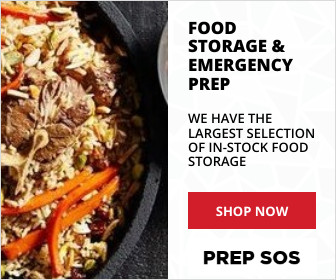 In our everyday lives we give much thought to preparing healthy, nutritious meals for ourselves and our families. The planning of nutritious but delicious meals is in the aim of every good home maker. But have you ever paused to think about the importance of meals in a time of crisis? What if a disaster strikes? An earthquake or an environmental disaster? What then? Assuming such a situation takes place all your attention would be focused on survival and making it through the situation not preparing meals.
In our everyday lives we give much thought to preparing healthy, nutritious meals for ourselves and our families. The planning of nutritious but delicious meals is in the aim of every good home maker. But have you ever paused to think about the importance of meals in a time of crisis? What if a disaster strikes? An earthquake or an environmental disaster? What then? Assuming such a situation takes place all your attention would be focused on survival and making it through the situation not preparing meals.
Since no one can predict when such a disaster might take place it makes sense to be prepared. For example, how much food would each individual in your family need per day? Or how much water should you have stored for each person. If you know the answer to these questions you are somewhat prepared and you can begin the process of keeping back up stores of these lifesaving supplies. What about the nutrition content of the food you will keep in storage? How will you plan out these meals and ration out food stores?
The important thing to remember is that in a survival situation focus should be on the calories per person per day. A good guide is the standard average of 2000 calories per person (although this varies with weight, age and levels of physical activities). So you should be able to provide about 3 meals each of around 650 calories per day. You should also have at least 3 days of stores minimum and according to stricter survivalist strategies upwards of 1 to 3 months of food supplies to be on the safe side depending on what type of crisis you are preparing for.
 Now this might seem a difficult task to take on if you plan to keep rations in the form of rice bags or cans. However, there is an easier way to store such large quantities of food stores in the form of natural food storage. These meals are specially packaged and designed to last long periods of time and they come in neat buckets and boxes that mean you don’t need too much storage space. A good example is the 2 week instant food storage pail which weighs around 4kg and provides 72 servings of food. The food in the pail is rationed into pouches and packets and contains everything from a breakfast of granola with milk to dinners such as pasta marinara with beef. If you store 1 bucket for each member of your family, you are all set to survive 2 weeks of any disaster without wasting important time and resources foraging for food in the case of an actual crisis.
Now this might seem a difficult task to take on if you plan to keep rations in the form of rice bags or cans. However, there is an easier way to store such large quantities of food stores in the form of natural food storage. These meals are specially packaged and designed to last long periods of time and they come in neat buckets and boxes that mean you don’t need too much storage space. A good example is the 2 week instant food storage pail which weighs around 4kg and provides 72 servings of food. The food in the pail is rationed into pouches and packets and contains everything from a breakfast of granola with milk to dinners such as pasta marinara with beef. If you store 1 bucket for each member of your family, you are all set to survive 2 weeks of any disaster without wasting important time and resources foraging for food in the case of an actual crisis.
What about the all-important elixir of life – water? According to FEMA you should have 1 gallon of drinking water per person per day. If you consider this for a family of four it means you need around 4 gallons of drinking water for just one day. A good idea is to store at least 3 days of water supplies. Since during times of crisis bottled water is the first to go you should keep clean trash cans for water collection and storage. It is also wise to invest time in identifying a source of fresh, clean water near you such as a river or stream. You should also be prepared to clean your own drinking water in case water supplies break down. Keeping bleach or chlorine to chlorinate drinking water is a good idea. In addition to this you can keep some of this water as drinks which provide quick nourishment and a boost of energy. The Refreshing Orange Bucket is one such item. This provides about 90 calories along with vitamin C and it has a storage life of 20 years, so you can just store one of these and forget about it until the time of need arises.
 While it is scary to think of a survival situation where you and your family are in danger, it is always good to be prepared. Remember to update your food stores and replace any expired items. You should also store medicines and any prescription medications any family member uses. Keep a cool head and plan in advance to give yourself and your family the best chance of making it through any situation with comfort and ease.
While it is scary to think of a survival situation where you and your family are in danger, it is always good to be prepared. Remember to update your food stores and replace any expired items. You should also store medicines and any prescription medications any family member uses. Keep a cool head and plan in advance to give yourself and your family the best chance of making it through any situation with comfort and ease.


